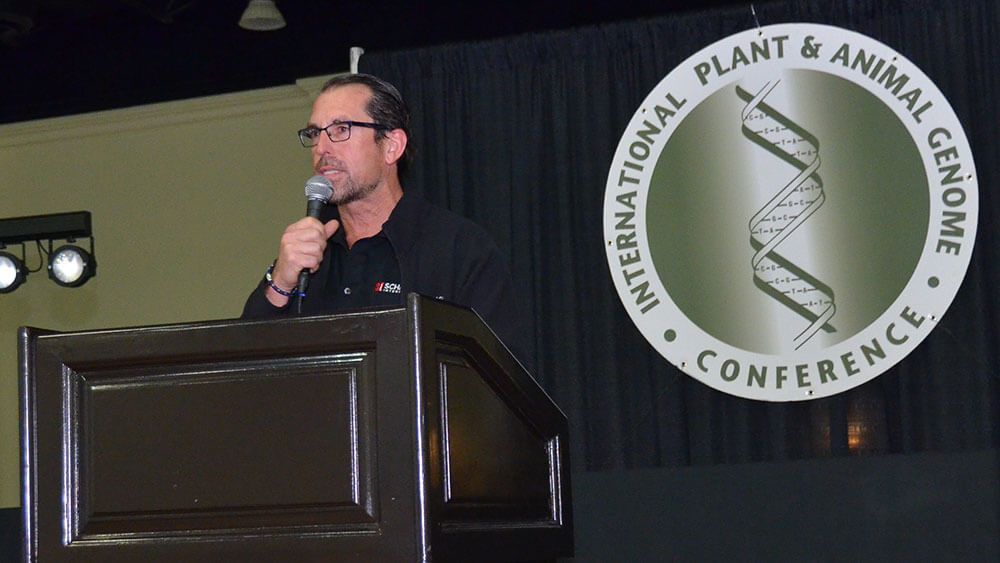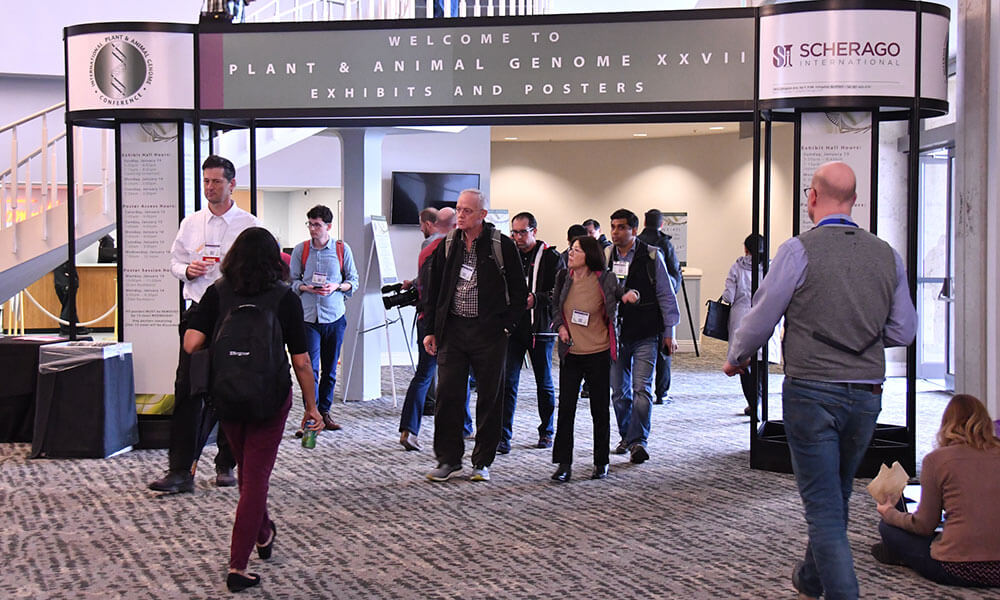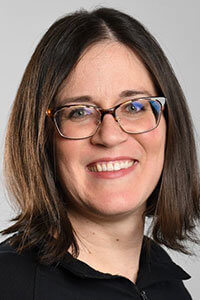
The government shutdown created headaches in the business events industry at conferences where government employees who were set to attend or speak were no longer allowed to do so.
A month before the 27th annual meeting of the Plant and Animal Genome conference (PAG) in San Diego Jan. 12–16, preregistration numbers were up 3 percent over 2018 and the meeting was on pace to set an attendance record, said Darrin Scherago, CEO of Scherago International, who manages the PAG conference.
Then came the government shutdown. When President Trump and
the U.S. Congress couldn’t agree on a budget, the federal government ground to a (partial) halt on Dec. 22, 2018, leaving 380,000 federal workers on unpaid leave and 420,000 others working without pay. Federal employees on furlough, including those from the U.S. Department of Agriculture and the National Science Foundation, many of whom were registered for the PAG meeting, are banned from doing anything related to their jobs during a shutdown, including speaking about government-funded research or responding to emails from a government address.
As the shutdown lingered into 2019, PAG leaders began hearing from registered attendees and speakers who would no longer be able to attend the meeting. More than 175 attendees canceled due to the shutdown, including 30 workshop speakers, Scherago said. Rather than celebrating record-breaking attendance, organizers spent the days leading up
to the meeting scrambling to find new presenters to fill holes in the program. In the end, the absence of government attendees left the meeting’s attendance down 2 percent from 2018.
“I was very concerned as the shutdown continued and there was no indication it would be resolved in time for the meeting,” Scherago said. “However, I can thankfully report the PAG scientific community persevered and we were able to minimize the negative impact of the shutdown. The attendees of PAG are a very passionate community and they were determined not to allow the shutdown to get in the way of science.”
While the challenges presented by a government shutdown aren’t insurmountable, they can throw a wrench into the plans for events like PAG whose audience and speakers come from the government sector. And while this particular government shutdown set records for its length, shutdowns are not uncommon. The U.S. government shut down for three days earlier in 2018 and narrowly avoided a shutdown in 2017. In 2013, when Congress and President Obama didn’t agree on health-care reform, the government shut down for 17 days. Other notable shutdowns occurred in 1995 and 2011.

Darrin Scherago speaks at the International Plant & Animal Genome Conference. (Karras Photography)
Domino Effect
As was the case with PAG, it’s not just a drop in attendees that event organizers have to deal with during a government shutdown — speakers from federal agencies are unable to attend or present. And even other attendees unaffected by the shutdown can feel its effects, including travel delays: Airport wait times increased significantly during the partial government shutdown this year and scores of Transportation Security Administration (TSA) workers called in sick rather than continue working without pay.
The domino effects of government shutdowns also can mean local attractions such as national parks and monuments, which could have drawn attendees and their families to the event, may be closed. And when shutdowns linger on, they can have an impact on food safety, leaving the Food and Drug Administration (FDA) without enough resources to inspect all the romaine, spinach, and beef that may be served at the meeting.
Like PAG, the American Meteorological Society (AMS) usually attracts a large number of scientists from federal agencies to its January annual meeting. With special events and short courses beginning Jan. 5, the Christmas and New Year holidays became a time of frenzied activity for AMS organizers. With the original hotel agreements, federal workers affected by the shutdown needed to cancel reservations right before Christmas in order to avoid penalties, said Claudia Gorski, director of meetings at AMS. Because Congress members were on recess during the holidays, federal workers didn’t know whether they’d be able to attend the meeting.
“We spent the holidays working with hotels to get the cancellation date moved to Dec. 27 or 28 so Congress could come back in session,” Gorski said. “We were able to get the date moved, but when the shutdown wasn’t resolved, we had to shift our efforts to how we could fill in for the presenters who would not be able to attend.”
More than 400 government attendees canceled their AMS meeting registrations, and 800 presentations that included lead authors with government email addresses had to be reorganized. About 15 speakers gave remote presentations and many others were able to allow co-authors who were government contractors to make presentations for them. For some sessions, AMS was unable to secure a speaker and instead filled the slot with a Q&A or discussion session — which turned out to be a good thing. “Attendees said they got a lot out of those discussions,” Gorski said. “They were vibrant and productive.”

Participants enter the International Plant & Animal Genome Conference. Attendance at the event was down this year due to the government shutdown. (Karras Photography)
How to Be Prepared
Organizations like AMS and PAG were able to recover from the hurdles caused by the government shutdown because of the organizational structures and processes they already had in place. Even if your meeting isn’t currently feeling the strain of a shutdown, take these steps to ensure you have the proper organizational infrastructure in place to overcome potential problems the next time the government stops functioning.
- Gather alternative contact information. Because government employees affected by the shutdown were unable to respond to emails to their government addresses, AMS had difficulties determining which speakers would and would not be able to present. The challenges continued on site, as some government workers paid their own way to the meeting, so they were present but unauthorized to present at their sessions.
“As our program chairs tried to fill all the holes in the schedule, communicating with presenters who had government email addresses was an ongoing challenge,” Gorski said. “We mostly communicated through the AMS community.” For the future, AMS is working to collect alternative email addresses for members, attendees, and speakers to avoid similar issues.
- Use those apps. Both PAG and AMS had mobile apps in place for their events, which became crucial for communicating with attendees about the many schedule changes initiated by government presenters who were unable to show. “Our printed program was useless,” Gorski said. “Our meeting app and website were updated continuously as sessions were changed. Meeting planners had to juggle their regular on-site work with constantly changing the schedule based on new information about which speakers were there and were or were not able to present.”
- Rely on volunteers. A strong volunteer network helped rescue sessions that would otherwise have been canceled at both AMS and PAG, as non-government members and attendees stepped up to present and moderate sessions or judge student presentations. PAG workshop organizers shared via social media a link to a volunteer document where attendees could add their names and areas of expertise. Using that document, organizers were able to contact volunteer speakers to fill vacancies in the schedule.

Heather Wakefield
- Reconsider dates. After the Regulatory Affairs Professionals Society (RAPS) meeting was affected by the 2013 government shutdown when a number of FDA speakers had to cancel, planners have avoided scheduling the conference to cross into the start of the government’s fiscal year, said Heather Wakefield, senior manager of education and events at RAPS. (The accounting period for the federal government begins on Oct. 1 and ends on Sept. 30. Fiscal year 2018 began on Oct. 1, 2017, and ended on Sept. 30, 2018.) If rescheduling isn’t possible, “stay alert to the news and anticipate when this might impact you,” Wakefield says. “Create a communication and cancellation plan for unexpected events; we’ve had to use this kind of plan in the event of government shutdowns and weather events that have affected our event.”
- Make backup plans. If attendees will be visiting government-operated attractions such as a national park, it’s a good idea to have an alternate excursion in mind. For instance, although some national parks and monuments remained open (but unstaffed) during the 2019 government shutdown, news outlets reported health hazards such as mounting trash bins and overflowing toilets.
If speakers include professionals from government agencies, give a heads up to non-government presenters that you may need their help to cover additional sessions. For instance, many scientific meetings include poster presentations, or posters that detail research for attendees to view but don’t include an oral presentation. In the future, Gorski intends to make contingency plans for poster presenters to be prepared to “switch over to oral presentations if needed,” she said.
Beyond being a nuisance to event organizers in the short term, shutdowns can have long-term consequences on entire sectors — like the scientific community — employed by the government.
According to an article in Physics World, shutdowns affect morale. “Scientists and engineers in government have said privately that they are polishing their CVs in the hope of job offers from the private sector,” the article stated. “They also fear that the shutdown will have reduced the appeal of government service for potential recruits.”
Nancy Mann Jackson is a freelance writer in Birmingham, Alabama.
More Shutdown News
Shutdown Stories
The Consumer Electronics Show (CES), the global trendsetting technology show produced by the Consumer Technology Association (CTA), drew thousands to Las Vegas this Jan. 8–11, but a number of its high-profile sessions had to be scrapped at the last minute. That’s because speakers such as Ajit Pai, chairman of the Federal Communications Commission, were unable to travel to the show due to the partial government shutdown. Other sessions pulled from the schedule included those featuring panelists and speakers from the Federal Trade Commission, U.S. Environmental Protection Agency, Department of Homeland Security, Federal Emergency Management Agency, and the Food and Drug Administration.
Held in San Francisco each January, the JP Morgan Healthcare Conference attracts thousands of health-care companies, industry leaders, and investors. When this year’s keynote speaker, Commissioner Scott Gottlieb of the Food and Drug Administration, was suddenly unable to attend due to the government shutdown, organizers reconfigured the conference to allow him to present remotely. While Gottlieb delivered his keynote address via video conference to thousands of investment bankers and health-care executives, his audio completely cut out, prohibiting listeners from hearing one of his key points, according to media reports. When the audio was reconnected, the sound quality created an echo, making it difficult for some attendees to understand what Gottlieb was saying.
About 200 government registrants and presenters were unable to attend the meeting of the American Astronomical Society (AAS) in Seattle, Jan. 6–10, said Kevin Marvel, executive officer. To make sure those who couldn’t attend still would benefit from the conference, AAS worked rapidly with its AV partner to find a low-cost solution for live streaming the plenary sessions. The live-streaming solution, which included just audio and the slides as they were, displayed without a video of the speaker, was such a success that AAS plans to provide it at future meetings as a membership benefit.
“We got a lot of compliments from folks at the meeting for providing this resource, even though they didn’t directly benefit from it,” Marvel said. “A society is a community after all, so when one segment is blocked from attending, the rest of the community is happy if they can be included in some way, shape, or form.”
